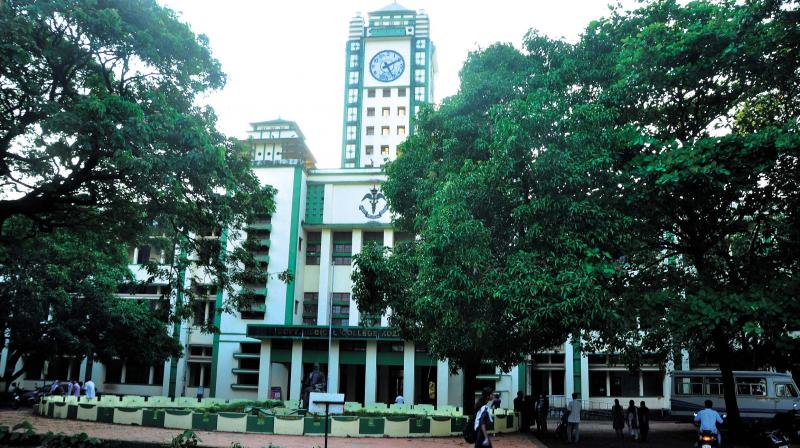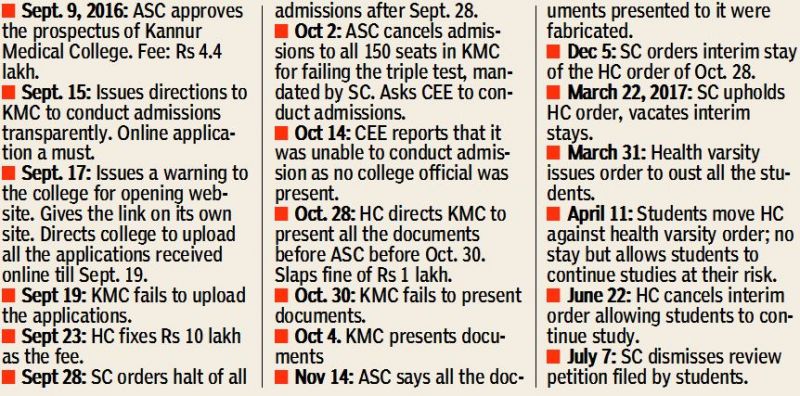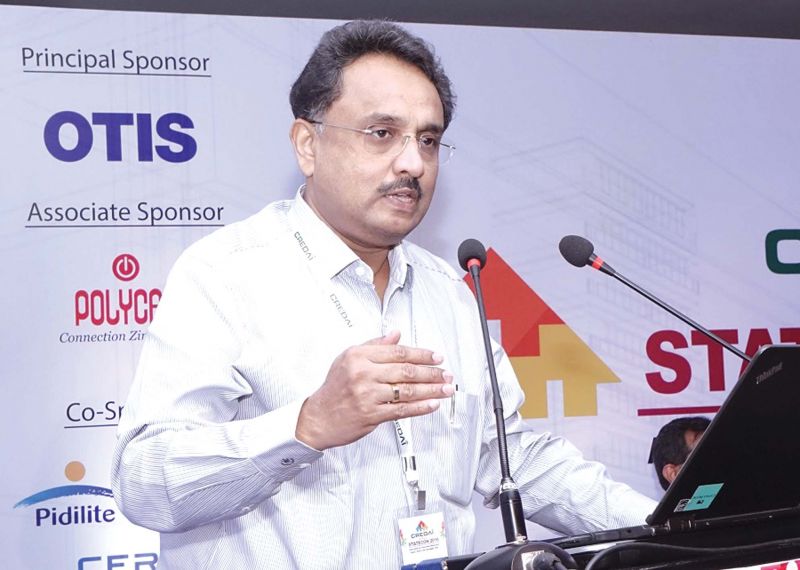Kannur Medical College got away with capitation fee
Top officials wanted government to act on ASC report but cabinet chose to ignore it.

Kochi: The state government chose to ignore the recommendations of the Competent Authority and the additional chief secretary (health) to initiate action against Kannur Medical College for collecting capitation fee in admissions to first year MBBS course for the academic year 2016-17 before proceeding to regularise the admissions.
In his report after considering the applications for admissions, Competent Authority B. Srinivas said, "in the light of the ASC report that the management of Kannur Medical College, Anjarakkandy, had indulged in collection of capitation fee while admitting students to medical discipline during 2016-17, appropriate action may be initiated against the college as mandated in Section 4 (7) of Act 19 of 2006."
Additional chief secretary (health) Rajeev Sadanandan favoured regularising the admissions of 44 students of the college based on the recommendation of the competent authority as "it is not fair to penalise the students who would otherwise have been eligible for admission for the criminal act of the college".
He, however, took a stand that the college must be made to pay for it. "From the report of the ASC, a prima facie case is made out against the Kannur Medical College for collection of capitation fee," he said in his note to health minister K.K. Shylaja. "So we may direct the ASC to take appropriate action against the college as per provision of the law but accept the admissibility of the students who have been found eligible by the competent authority."
DC accessed the notes after filing applications under the Right to Information Act. However, the government whose ideological position has been against profiteering and collection of capital fee by self-financing professional colleges has overlooked the recommendations but went ahead with the process to regularise the admissions.
"We have got no communication from the government on taking action against the college," Admission Supervisory Committee chairman R. Rajendra Babu told DC.
Ordinance, a set of contradictions
The Kerala Professional Colleges (Regularisation of Admission in Medical Colleges) Ordinance 2017, brought in to overcome Supreme Court and High Court judgements which closed the doors on 137 students of Kannur Medical College and 31 students of Karuna Medical College, Palakkad, is fraught with internal contradictions, legal experts say.
The preamble of the ordinance says "no fault was found on the part of students who got admission in the colleges" giving an impression that the students were denied the admission only because the colleges failed to present the records before the Admission Supervisory Committee in time. However, Section 2 of the ordinance says "it shall be lawful for the Government to regularise the admission of candidates who were qualified for admission in the discipline of medicine in any medical college in the state during the academic year 2016-17 but their admission was cancelled by any court or Admission Supervisory Committee irrespective of the mode of submission of application…"
The standing instruction by the Admission Supervisory Committee for the academic year 2016-17 for the students was to apply only through online mode so as to cut off one of the ways through which managements manipulate the admission process. "The reference not take into account the mode of submission of application is clearly a ploy to help the students who flouted the instruction of the ASC," said a senior lawyer. "This is against the preamble of the ordinance."
Section 2 of the ordinance protects the process of regularisation against the provisions contained in Act 19 of 2006, any judgment, decree or order. However, Section 4 of the ordinance directs the Competent Authority to consider "whether the student who got admission is qualified and is eligible as per the rank list prepared on the basis of the National Eligibility cum Entrance Test, for admission in the discipline of medicine as per laws and orders in force applicable for the academic year 2016-17."
"These provisions are contradictory," said a senior official. "If the government wanted only this ordinance to be the basis of the process, ten there should have no reference to the 'laws and orders in force applicable for the academic year 2016-17'".
 As events unfolded
As events unfolded
Law secretary hides proof, misleads govt
While law secretary B.G. Harindranadh dismissed the findings of the Competent Authority saying there was "no material available to prove that the colleges collected capitation fee," RTI documents prove otherwise.
In its report forwarded to the director of medical education who sought its opinion as part of the regularisation process, the Admission Supervisory Committee presented a list of 12 students who had paid the management of Kannur Medical College amounts exceeding their fee, and the amounts ranged between Rs 22 lakh and Rs 45 lakh. Some of the parents had deposited post-dated cheques apart from making the big chunk of the payments in cash, according to the petitions they had filed with the committee.
The committee also forwarded to the DME petitions by the students seeking a direction by it to the college management for the return of their documents and the money they had paid. There are documentary evidence to prove that the committee allowed some of the parents to withdraw their petitions after they submitted that they had got their money back from the college management, giving reasons for the committee to come to the conclusion that the colleges had indeed collected capitation fee.
 B.G. Harindranadh
B.G. Harindranadh

